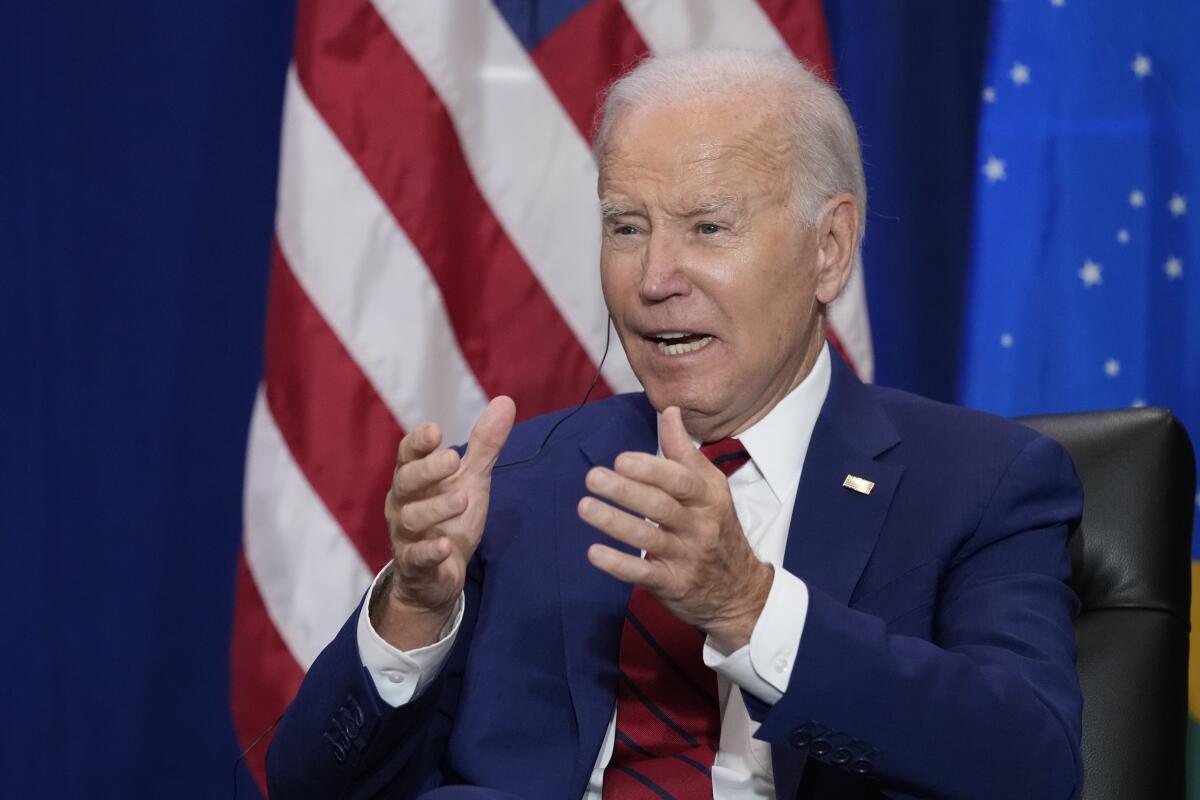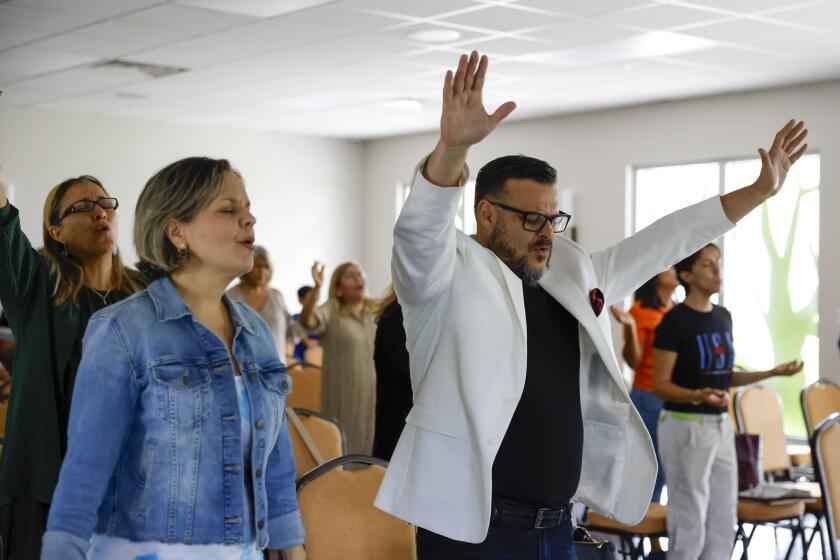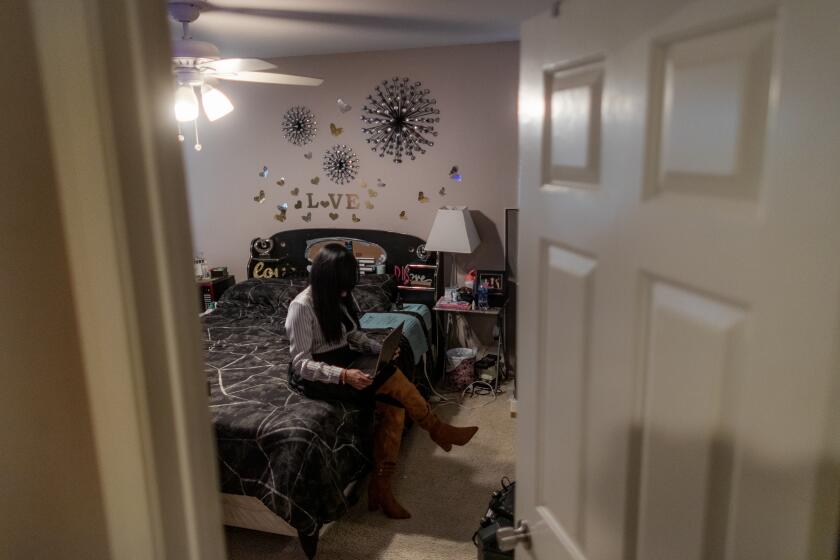U.S. to allow hundreds of thousands of Venezuelans in the country to work legally

- Share via
WASHINGTON — The Biden administration says it’s granting temporary legal status to hundreds of thousands of Venezuelans who are already in the country — quickly making them eligible to work — as it grapples with growing numbers of people fleeing the South American country and elsewhere to arrive at the U.S.-Mexico border.
The move — along with promises to accelerate work permits for many migrants — may appease Democratic leaders who have pressured the White House to do more to aid asylum seekers, while also providing grist for Republicans who say President Biden has been too lax on immigration.
The Homeland Security Department plans to grant Temporary Protected Status to an estimated 472,000 Venezuelans who arrived in the country as of July 31, making it easier for them to get authorization to work in the U.S. That’s been a key demand of Democratic mayors and governors who are struggling to manage an increased number of migrants in their care.
That’s in addition to about 242,700 Venezuelans who already qualified for temporary status before Wednesday’s announcement.
The protections for Venezuelans are significant because Venezuelans account for such a large number of the migrants who have been arriving in the country in recent years.
Venezuela plunged into a political, economic and humanitarian crisis over the last decade, pushing at least 7.3 million people to migrate and making food and other necessities unaffordable for those who remain. The vast majority who fled settled in neighboring countries in Latin America, but many began coming to the U.S. in the last three years through the notoriously dangerous Darien Gap, a stretch of jungle in Panama.
Members of the country’s largest Venezuelan community in Miami have had mixed reactions to Gov. Ron DeSantis’ treatment of immigrants, including his decision to transport migrants to other states.
Venezuelans who arrive in the U.S. after July 31 of this year will not be eligible for the protection. Those who are now eligible have to apply to get it.
Homeland Security Secretary Alejandro Mayorkas granted the expansion and an 18-month extension for those who already have temporary status because of “Venezuela’s increased instability and lack of safety due to the enduring humanitarian, security, political, and environmental conditions,” the department said in a statement.
The administration said it would accelerate work authorizations for people who have arrived in the country since January through a mobile app for appointments at land crossings with Mexico, called CBP One, or through parole granted to Cubans, Haitians, Nicaraguans and Venezuelans who have financial sponsors and arrive at an airport. It will aim to give them work permits within 30 days, compared with about 90 days currently.
The promise of accelerated work permits does not apply to people who cross the border illegally and seek asylum, who, by law, must wait for six months to receive work permits.
Two families escaped Venezuela under two different immigration policies. A new Biden program allowed one family get travel approval in a matter of weeks. Another Trump-era program barred another family from seeking asylum in the U.S., deporting her.
Mayors and governors have been clamoring for Biden to figure out a way to get newly arrived migrants to be able to work legally so that they can support themselves.
Democratic officials in New York, Massachusetts, Chicago and elsewhere have complained about the strain that newly arrived migrants are putting on their resources, especially in New York, where the government is required to provide housing for anyone who needs it. The city is currently paying to house about 60,000 newly arrived migrants.
New York Gov. Kathy Hochul said in a statement late Wednesday that she was “grateful the federal government has acted so speedily to grant one of our top priorities: Temporary Protected Status to Venezuelan asylum seekers and migrants who have already arrived in this country.”
The city’s mayor, Eric Adams, has been especially critical of the Biden administration. On Wednesday, he praised the decision to grant protections to Venezuelans and thanked the administration for listening to the city’s concerns.
A neighbor of a New York migrant shelter sets up a loudspeaker on his lawn that repeatedly blares, ‘Immigrants are not safe here’ in six languages.
The number of migrants trying to cross the southern border is rising. That poses a severe challenge for the administration, which has struggled to show it is in control of the border in the face of Republican criticism. The city of Eagle Pass, which borders Mexico along the Rio Grande in southern Texas, announced a state of emergency Wednesday because of a “severe undocumented immigrant surge.”
According to Maverick County Sheriff Tom Schmerber, about 2,700 migrants crossed into Eagle Pass on Tuesday and about 3,000 on Wednesday.
The administration also said Wednesday that it was also using Defense Department forces to support Homeland Security staff on the border. Homeland Security already uses about 2,500 National Guard troops to help Customs and Border Protection. In the news release, Homeland Security said up to 800 new active-duty troops would also be detailed to the border; they would be used for tasks like logistics to free up customs officials for more front-line responsibilities.
Homeland Security said it was also taking other steps to deal with immigration, such as scaling up a process started in May to quickly remove families who are found to have no basis to stay in the country. The agency said it has also beefed up holding capacity along the southern border.
And it said it has increased the number of people expelled from the country. Since May 12, the agency said it has removed 253,000 people to slightly more than 150 countries around the world. That compares with 180,000 removed during the same period in 2019.
More to Read
Sign up for Essential California
The most important California stories and recommendations in your inbox every morning.
You may occasionally receive promotional content from the Los Angeles Times.













